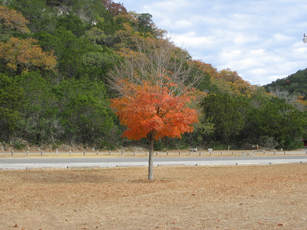 For some folks autumn is associated with falling leaves, cooler temperatures, shorter amounts of daylight, and a proliferation of pumpkin-spiced foods and drinks. However, it is also the season of angels and saints. We have various liturgical celebrations of saints throughout the year, of course, but during this time of year they seem to occur almost every day. My love for autumn was enhanced many years ago by the experience of making the Spiritual Exercises of St. Ignatius Loyola, a silent 30 day retreat. It is memorable and spiritually life-changing no matter when one undertakes this long retreat; it can alter the way we make decisions, experience God, and how we respond to Him. As I recall, the retreat was augmented by the gorgeous sights and smells of this season, but also by the various feasts, solemnities, and memorials in the liturgical calendar. Of course, the silence of retreat brings new ways of listening which include using all of our senses to recognize the presence of God and to hear without necessarily having to use our ears; we learn the language of the heart, God’s language. In my experience, everything seemed to become more vivid and therefore I saw things that had previously gone unnoticed. I think that is how it is with the angels who surround us: we are not intentionally looking for them and so the result is that we do not see them or the work they do. Perhaps if we open our awareness to their presence just as one becomes more aware during retreat, we can learn to notice them and also to discover that we are called to work quietly as they do, looking to spread the Kingdom by reflecting the love of God. 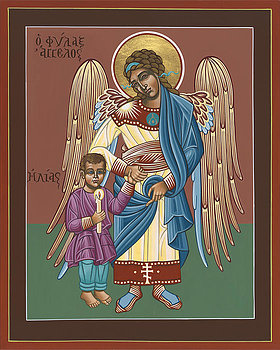 On our liturgical calendar there are two celebrations in the space of four days which are centered on the angels. The first is the Feast of the Archangels, Gabriel, Raphael, and Michael, which is celebrated on September 29, and the second is a memorial celebration of the Guardian Angels on October 2. That there are two separate memorials shows that the angels are obviously of importance to the Church and therefore we should pay attention to their presence. We are taught from the beginning of the Old Testament that angels are messengers of God; in fact the very word “angel” comes from the Hebrew which literally translates as “messenger.” Through numerous Scripture references and various theologians scattered throughout Church history such as St. Basil the Great, St. Bernard of Clairvaux, and St. Thomas Aquinas, we are taught that we each have a guardian angel to protect, guard, and guide us throughout our lives. We are also taught that there are nine 'choirs' of angels. Each choir (or grouping) has a unique function, such as the Seraphim who are the ones closest to God who burn with zeal and love of God, or the Scripturally revealed and named ‘big three’ of the choir of Archangels: Raphael, who guided and healed the protagonists in the Book of Tobit, Michael, who led the armies of angels in some major battles between good and evil (Daniel 7 and Revelation 12), and Gabriel, who brought messages to Mary and Joseph (Luke 1 and Matthew 1) and is also named in the letter of Jude. 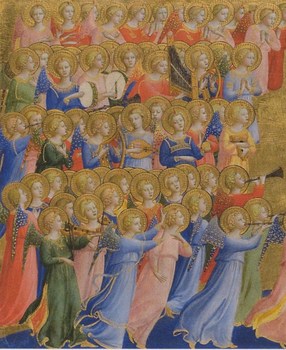 It is important to be aware that while there are different choirs of angels, they are not in a hierarchy of more or less importance, nor are they in some sort of competition, but rather are ‘ordered’ because each group has a differing function. One description of angels I particularly love is that of the poet Dante Alighieri who described angels as “countless mirrors that reflect God’s love.” (Slight paraphrase)* One translator of The Divine Comedy explains it this way: “Just as God’s light is received differently by each angelic being, so each angel displays a different capacity to love based on its vision of God.”** Therefore, if we are to take away anything from the notion of choirs, it is that like people, angels have different ministries and missions, but all of them include love. Just as St. Paul says that the Church is like a body made up of different members, each important for their diverse functions, (1 Corinthians 12) so too is the angelic realm made up of diverse members with different ‘gifts.’ Therefore, if we are to learn from them, it means that each one of us is called to become such a mirror, reflecting God’s love through whatever gifts we have been given and in everything we do. 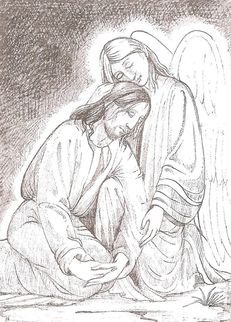 We cannot limit our sense of the identity and function of angels to only that of protection, important as that is. Their guidance in the way of love, which is the way of Jesus, is essential to our lives as Christians. They are also gifted in offering comfort, especially in dire times: even Jesus had need of an angel when He was suffering in the Garden. Their service to us, therefore, is essential. Additionally, that we should take the angels seriously is attested to not only by various theologians, but also in the text of the liturgy. In the Penitential Rite at the beginning of Mass we pray the Confiteor prayer which includes a request for intercession from the entire community in the Body of Christ: “…therefore I ask blessed Mary ever-Virgin, all the Angels and Saints, and you, my brothers and sisters, to pray for me to the Lord our God.” This means that not only do we believe that they protect us, but that they pray for us when we request it, (and no doubt at any time when they think we need it.) It also seems reasonable to think that a guardian angel works with the Holy Spirit to make sure that we see and hear what God wants to reveal during our time of prayer, teaching us how to discern between what leads us closer to God and that which we should avoid, in addition to helping us come to a greater sensitivity to the needs of those we encounter in our daily lives. God’s grace is not arbitrary, and so we know that He intentionally assigns an individual angel to each person, suited to whatever needs and/or gifts we have been given. As angels reflect God’s love and God’s glory, they can bring to us a deeper awareness which takes root within our mind and heart. Therefore they do have a role in helping us to become more sensitive to the needs of others, to become better listeners - (to be heard is often all the other person really desires) - and to do it all with patience, mercy, and compassion.  If we aspire to learning from the angels we can ask them to teach us humility. As I said earlier, they do not try to climb the ‘choir ladder’ to somehow become nearer to God.*** Like them, we should embrace the call we have been given rather than desiring one we deem to be better or more worthy. We need to embrace the unique call we have, since our gifts lie within it: like the angels, all of us have important, though differing, gifts to offer. Nor do they concern themselves as to whether we are aware of them or not, (though they are more effective when we consciously call upon them.) They demonstrate how, in humility, we should seek to simply do the work and not seek the glory; we should not seek attention and the reward of adulation. A second thing they teach us is not to confuse the message with the messenger. We are not to get caught up in wondering about the identity or name of our angel, as some ‘new-age-y’ lore mistakenly encourages. Rather we should focus on what God is revealing: perhaps it is in reference to His call, or protecting us from an evil which seeks to ensnare us, or something about His great love. We can learn to focus on others and their needs in a way which brings the message of love and mercy without it having to be ‘about us.’ 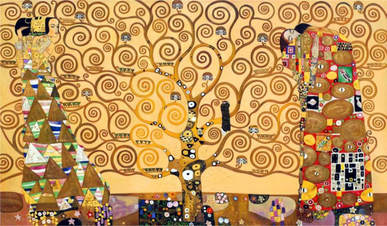 Finally, the angels can teach us the joy of being in community as one Body of Christ. Although they are in different choirs with specific functions, they work together as a whole to serve God; they are one community, just as we are one people, one family in the Body of Christ. Just as Dante depicted them as each having a different capacity to love based on their different way of perceiving or seeing God, so too are we called to mirror the love of God based on our individual personalities and traits. Like the angels, we can bring light and love to a world which often feels like the darkness is encroaching more than we can withstand. If our faith, hope, and love can be enlivened by the angels and we can become as mirrors of the goodness, mercy, and love of God, then we can bring Christ into the darkest of places. Let us trust our angelic guardians to safeguard our faith, bring hope where we are tempted to despair, and to be as countless mirrors reflecting the love of God. May we be more conscious of the work of our guardian angel, offering gratitude for that which the angel does to guide and protect us daily! May we turn to the angels often, asking them to show us how to serve God specifically, moment to moment! May we have the humility to serve without need for reward! May we be a comfort to those who suffer or mourn, being as an angel to them! And may we reflect the love of God, acting as a mirror of His mercy and compassion! Let us continue to meet in the heart of Jesus! Peace! ©Michele L. Catanese * Divine Comedy, Part Three: Paradise, Dante Alighieri, Canto XXIX: 142-144: “And now you see the height, you see the breadth of Eternal Goodness that divides Itself into these countless mirrors that reflect Itself, remaining One, as It was always.” ** The translator of the version used here for both notes is Mark Masa, (Penguin Classics edition of the Divine Comedy). The quote above was in his notes which accompany the text. *** Angels could not ‘climb the ladder of hierarchy even if they wanted to. They are created to be as they are. Note: Next post October 23. Images: 1. This is one of my photos, taken in Lost Maples State Park in Texas. It is one of my favorite autumn photos since it shows the stark contrast of the brightly colored leaves, some fallen, with the greens of the trees which have not yet turned color. 2. This icon is called Guardian Angel Guiding Little Elijah Gemmell by Fr. William Hart McNichols. I chose it because I love how it shows the angel taking the little boy by the hand and leading him. The lighted candle reminds me that the angels protect, instruct and guide. If you are interested in purchasing a copy it can be found at https://fineartamerica.com/featured/guardian-angel-guarding-little-elijah-gemmell-191-william-hart-mcnichols.html. (Remember, I do not get anything from promoting Fr. Bill's work, except the joy of sharing it with you.) 3. This is a wonderful painting called Christ Glorified in the Court of Heaven (1419-21) by Bl. Fra Angelico. I chose it because it depicts a multitude of angels playing instruments and making what seems to be a joyful noise. They seemed to be like "countless mirrors" each with a "differing capacity to reflect God's love in many ways." 4. Next is a drawing by Fr. William Hart McNichols which accompanied a reflection on the Agony in the Garden. The book containing the reflection was written by Fr. Basil Pennington; it is called The 15 Mysteries. (It was written before St. Pope John Paul II added the Mysteries of Light to the Rosary.) I think this is one of the tenderest drawings on this mystery I have ever seen. 5. This is a photo I took on a recent trip to the Rocky Mountains in Colorado. I chose to use it here because the mountains are indeed humbling when one stands upon a plain or in a valley and looks up at them. 6. This is a wonderful image called Tree of Life (1905) by Gustav Klimt. I chose it because I loved all the details it contains. It reminds me of the Tree of Life at creation in the Garden of Eden, (Genesis 2) and at the end of the Bible in Revelation 21 and 22. "The angel showed me the river of life giving water, sparkling like crystal, flowing from the throne of God and the Lamb down the middle of its street. On either side of the river grew the Tree of Life..." (Rev 22:1-2) There is a reference here to the angel guiding the author, John, in the vision, and also the tree sparkles, as does Klimt's work. Klimt has not only captured that reference, but the details of the painting show people who symbolize (for me) the Body of Christ. Take a look at it in a larger detail if you really want to see everything contained in this work. This should give you a closer look: http://www.looklateral.com/wp-content/uploads/2015/06/Albero-della-vita-di-Gustav-Klimt-1905-1909.jpg
Elise
10/9/2017 12:41:53 pm
Thanks for this interesting essay about angels. I need to be reminded
Topsy Art
10/10/2017 03:49:32 pm
Really lovely Michelle!
David
10/11/2017 01:41:59 am
Dear Michele, Comments are closed.
|
Heart Speaks to Heart
|

 RSS Feed
RSS Feed

